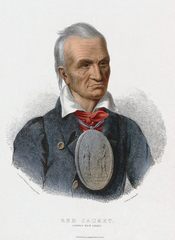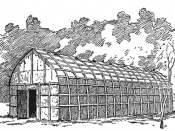Although the Micmac and the Iroquois Confederacy are both Aboriginal groups, they have many differences as well as similarities. One area of such, is their traditional justice systems. Their governments and laws are in some ways similar, but in many ways different.
The Micmac reside in what is now Nova Scotia, eastern New Brunswick, Prince Edward Island, and southern Gaspe. The territory was subdivided in to seven districts. Each of these districts contained family groupings in small settlements based on hunting and fishing. Those from P.E.I. held more territory in common than any other Micmac district. Their land was allotted by family.
The Iroquois were a agricultural people. They lived in permanent villages in a domain now called southern Ontario, southern Quebec, and northeastern United States. Indian Nations living here formed a formal and lasting confederacy by 1450. Their members were called 'Ho-De-No-Sau-Nee'. The league was called 'Kanonsionni', meaning EXTENDED HOUSE.
The first five nations to join the confederacy were Mohawk, Oneida, Onondaga, Cayuga, and Seneca. Tuscaroras migrated from Carolina and joined the confederacy in 1722. The Iroquois are bound in a treaty of friendship with the Ojibway to the North.
The Micmac government was three-tiered, with local, district, and national chiefs, or 'Sagamores'. Each settlement's council of elders chose a local chief. The chief was the focus of power in the settlement. The local chief attained position through both hereditary right and meritorious behavior. The oldest son of a dead chief was usually given first consideration as a successor. If he was found unfit for office, despite special training, others in family and/or others in the community were considered. These chiefs usually had two assistants or captains. These were called second and third watchers. They would assume command from a sick or incompetent chief. The local chiefs...


